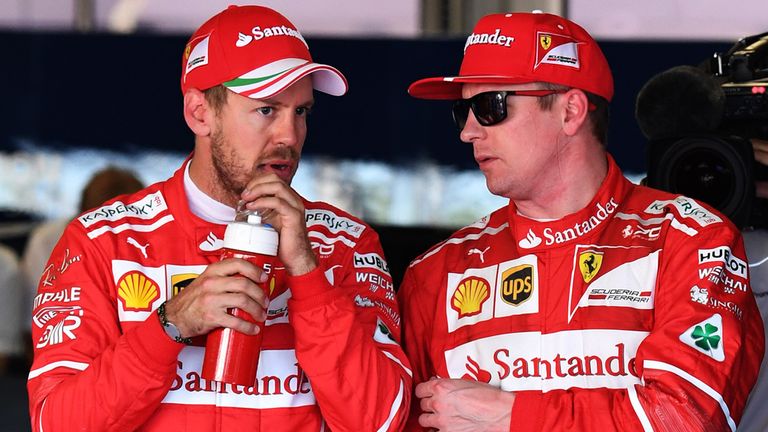Martin Brundle: Ferrari play the team game perfectly to maximise Mercedes' pain in Monaco
Sky F1's Martin Brundle reflects on the 'great paradox and conflict' at the heart of F1 after Ferrari achieve the perfect result in Monaco...
Tuesday 30 May 2017 18:02, UK
Ferrari achieved their perfect result in the correct finishing order at the Monaco Grand Prix in relation to both world championships. Was that because of good fortune and pace for the team and Sebastian Vettel - or just well orchestrated?
With Lewis Hamilton on the ropes and the Mercedes team generally struggling on the smooth tarmac and twisty low speed layout - notwithstanding Valtteri Bottas's outstanding qualifying effort - Ferrari had to inflict maximum pain if they could achieve the one-two which beckoned from a front row lockout.
Many teams have played the team strategy game over the decades, none more so than Ferrari. Michael Schumacher's speed and relentless delivery pretty much guaranteed that his Ferrari team-mate, be it Eddie Irvine, Felipe Massa or Rubens Barrichello, became a support act. When he broke his leg in 1999 the stand-in Mika Salo had to give up his only chance of a victory at Hockenheim to yield for Eddie Irvine.
The swap around between Barrichello and Schumacher in Austria in 2002 was painful to observe. In 2007 Kimi Raikkonen had the support of his Ferrari team-mate Felipe Massa to become champion. Raikkonen returned the compliment in 2008 but it didn't quite work out as many will vividly remember at the Brazilian GP when Hamilton secured the title two corners from home.
My first ever race as a driver manager was for David Coulthard in Melbourne 1998 for the first race of the season when Mika Hakkinen misheard a radio call and mistakenly pitted giving Coulthard an apparent and well-deserved victory in a totally dominant McLaren. Except that the team reversed the duo claiming it was a team error and that they would repay David back.
Whilst they rewarded him financially as if he had won the race they never 'paid him back' on track and it became a pressure point from thereon, having already moved him over in some kind of arrangement with Williams in the final GP of 1997 in Jerez. I had the mother and father of an argument with team boss Ron Dennis but to little avail. DC never fully recovered from those events reputation-wise, and for a good while psychologically. It's a horrible scenario.
Many other teams have played this game not least Mercedes in Malaysia 2013 when Ross Brawn firmly informed Nico Rosberg how it was going to be. Just as Mercedes used Bottas to hold up Vettel at the last race in Spain. As indeed Raikkonen was compromised in China on strategy.
And that's before we get into 'Multi 21 Seb' and all kinds of other sagas. And so on. No wonder Christian Horner of Red Bull and Toto Wolff of Mercedes didn't try to score any political points off Ferrari post race, they know that what goes around comes around and they could be next in line for such accusations even given that since 2011 the regulations no longer forbid team orders.
This has always been, remains, and always will be the great paradox and conflict of Formula One. Two individual sporting professionals working in a team environment effectively as employees representing hundreds of other employees as the final link in the chain, and hundreds of millions of dollars of investment by manufacturers and sponsors. And to add to the pressure, always first and foremost measured against their team-mates.
The power lies with the teams. I'm not going to sit on the fence, if I was Ferrari with one driver facing a six-point lead over a struggling Hamilton and 55 point lead over his team-mate, I would have seized the opportunity to maximise the advantage.
But it's so early in the season, I hear many say. That's not relevant, world championship points are purely numerical and carry no timeline or emotion when added up at the end of the season. Early team strategy calls can come back to haunt you if one driver subsequently has a string of problems or hurts himself but that's the risk you have to take.
Vettel leaves Monaco with a whole race worth of points advantage over the mighty pairing of Hamilton and Mercedes in a season which is going to the wire.
But did Ferrari in fact take any such action? Just as with the strategy squabble between the Red Bull drivers, could anyone have known that Vettel and Ricciardo would put in such blistering laps on used ultrasofts when Verstappen, Bottas, and Raikkonen pitted on laps 32-34 respectively for new supersofts?
In the paddock before the race when Crofty and I spoke with our third man in the commentary box Mark Hughes, our main conversation was to look out for the 'overcut' - pit later, not earlier - which would be the only way to go in the race given such low tyre degradation, the lap time differences between compounds, and the poor warm-up performance. And that was a broadly held view.
If Ferrari needed to cover off the Red Bull pit stop move with Verstappen on lap 32 you would imagine they would normally have pitted their second car of Vettel which was most vulnerable. But in fact Raikkonen had been slowing from his early pace, partly due to catching backmarkers in Button and Wehrlein, but for several laps before that due to his lap times. Was he trying to back Vettel into the pack and hope he was going to avoid any swap around later if Vettel slipped back to third or worse?
Why were Vettel's tyres so much better than Raikkonen's to allow him to push so hard in the crucial five laps until he pitted on lap 39? Why was Vettel's in-lap over a second faster?
Raikkonen didn't get the rub of the green in traffic, of that there's no doubt, but if he had the pace he should have checked-out up front and nailed the backmarkers so that it didn't matter when Vettel pitted.
He should also have pressurised Vettel all the way to the flag after the one and only pit stop and hope he could force him into an error rather than coasting to the end, you never know what's going to happen especially on a track which was breaking up in turn one along with Safety Car appearances. It was as if he knew he couldn't win...
In the end the fastest driver and car combo won and whether Ferrari would have applied team orders later on we'll never know. The extra seven points Vettel gained by winning rather than finishing second more than covered off the six points Hamilton salvaged. That championship lead gives them options and freedom as opposed to the pressure Mercedes now has.
Jenson Button drove beautifully until just before the end of his race. He was fast and faultless in his ever fluid and stylish way, it was an impressive one-off appearance although his contact with Werhlein's Sauber was the action of a frustrated and rusty driver.
Fernando Alonso was impressively plumbed into Button's radio as he prepared for the start of the race to wish him luck and ask him to look after the car. Jenson replied that he was going to 'pee in his seat' (a habit which always pleases the mechanics). Was this to mark his territory in advance of a full-time return? I doubt it, I suspect it was more to thank him for the bag of used bits he had left him which were masquerading as an engine.
F1 has been lucky this year thanks to Ferrari taking the fight to Mercedes and therefore some welcome uncertainty and wheel-to-wheel action. I always get perennial comments post race about how boring narrow and twisty Monaco is, just like we always get positive comments about other great races. But that was a particularly uninspiring race. I've never seen so little action out of the tunnel and into the harbour chicane. With so much grip the cars catapult out of Portier, treat the tunnel like a straight line, and barely move under very late braking on what used to be one of the trickiest zones of the whole season.
The only overtake I can remember was Marcus Ericsson passing the safety car just before hitting the barrier with brake and tyre issues. The other few attempts were clumsy half chances which ended in double race ending contact.
We cannot wait until 2021 to sort out these overweight, overcomplicated, overly expensive, whispering cars. I've said it before. And I'll keep saying it.
MB




